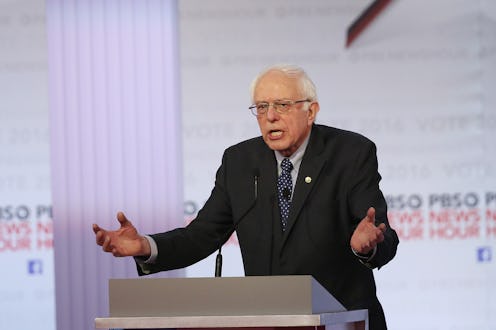News
The One Surprising DemDebate Race Question
The sixth Democratic Debate at the University of Wisconsin in Milwaukee was filled with surprises. A more nuanced debate since the left whittled its prospects down to just Bernie Sanders and Hillary Clinton, the Thursday night showdown marked an important point for both candidates. As the two eye an upcoming South Carolina primary, the Nevada caucuses, and the all-important Super Tuesday, the presidential hopefuls are looking to set themselves apart, particularly when it comes to attracting minority voters. PBS moderators Gwen Ifill and Judy Woodruff certainly recognized the importance of this and asked both candidates questions about issues facing people of color. The one surprising DemDebate race question that no one was expecting was when Ifill completely pivoted, shifting the focus onto Caucasians.
Following questions on mass incarceration as well as the difficulties faced by minorities in this country, Ifill flipped the script, so to speak. Ifill asked:
Let me turn this on its head, because when we talk about race in this country, we always talk about African-Americans, people of color. I want to talk about white people... If working- class, white Americans are about to be outnumbered, are already underemployed in many cases, and one study found they are dying sooner, don't they have a reason to be resentful, Secretary Clinton?
Sanders incredulously repeated the words "white people," almost in shock that such a debate that so heavily addressed pressing issues of race would return to the majority. Ifill then questioned candidates about the hardships facing more disadvantaged white citizens, with Sanders touching upon rampant drug issues facing such a community as well as the unaddressed problem of mental health issues facing all races across the nation. Clinton, for her part, discussed the plight of working poor white citizens, though she did state that she is "deeply concerned about what's happening in every community in America."
The moderator further prodded the subject of race, asking Sanders if she was off the mark by even evoking such a thing. "Is it even right to be describing this as a matter of race?" Ifill posited. Sanders agreed with the journalist yet chose instead to frame the issue of racial outrage as one of economic despair. Sanders said:
Yeah, you can, because African-Americans and Latinos not only face the general economic crises of low wages, and high unemployment, and poor educational opportunities, but they face other problems, as well. So, yes, we can talk about it as a racial issue. But it is a general economic issue.
The fact that Sanders did agree with Ifill speaks volumes. Ifill's initial question was wholly unexpected but certainly prompted a deeper dialogue about the nature of race in socioeconomic issues and why such inequality still such an important problem to address.
